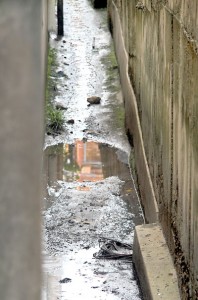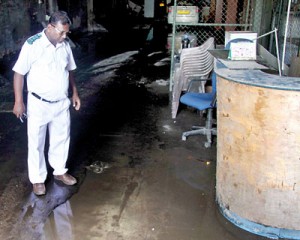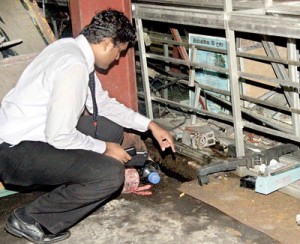News
Health goes down the drain at drugs corp
“Your health is our concern” is the motto of the State Pharmaceuticals Corporation of Sri Lanka, but a team of health officials this week discovered that the basement of the SPC head office in Colombo was a breeding ground for dengue mosquitoes.
At least 13 employees of the corporation were down with dengue recently.
Following complaints that the state-owned corporation, in Fort, was a mosquito breeding ground, a team of health officials had, some time ago, inspected the premises and found the SPC car park overflowing with water due to blocked drains.
After having promised the dengue taskforce that the drains would be fixed, the corporation took measures to do so.
Following another complaint, however, two health officials visited the premises on Thursday.
Lurking in the shadows of the unlit car park were adult dengue mosquitoes and amidst discarded rubble and leaking pipes in the vast car park the officers came upon several dengue mosquito breeding areas, Colombo District 2A Medical Officer of Health Dr. Subash Mendis said.
“I noticed several adult dengue mosquitoes, and where there are adult dengue mosquitoes there are always mosquito breeding places and I did notice quite a few of these breeding places,” the senior health official told the Sunday Times.
The team moved to the right wing of the building and there discovered rubble created by renovation work following a fire at the corporation premises. This was a potential dengue mosquito breeding ground, Dr. Mendis said, and should have been cleared.
“The fire occurred almost two months ago. They are still in the process of mending the roof of the building and rainwater flows to the basement and mosquitoes breed there,” a distraught employee of the corporation said.
“The mosquitoes used to bite us daily and we have complained to the managers. It used to be really bad and on some evenings my skin used to be red from the mosquito bites,” the employee added.
 “They approved duty leave for the workers who fell ill with dengue but I fear for many of the drivers and labourers who also got dengue – they live in far-off places and many of them are boarded in Colombo and could face problems,” the employee said.
“They approved duty leave for the workers who fell ill with dengue but I fear for many of the drivers and labourers who also got dengue – they live in far-off places and many of them are boarded in Colombo and could face problems,” the employee said.
SPC General Manager K.M.D.R. Dassanayake had appealed to health officials for more time and had assured them that the premises would be cleaned out.
Mr. Dassanayake had admitted that 10 employees of the corporation had been taken ill with dengue and that it was the SPC’s responsibility to clean the premises, a source in the corporation said.
“He had claimed that there was no proper method of disposing of all the rubble but had promised the officials to do his best to have the premises cleared out by Monday, November 17,” the source added.
“I told them that the premises will be inspected on Monday and warned them that legal action would be taken if the premises are not cleaned out by then,” Dr. Mendis said.
“We have a few redundant items in the car park and as a government organisation we cannot just get rid of these items. We have to issue tender notices for them. However we have immediately commenced activities to dispose of these items,” Mr. Dassanayake told theSunday Times.
“We are also receiving the help of the army to get rid of these items,” he added.

Breeding ground for dengue mosqitoes: Pictures show health officials inspecting the SPC headquarters. Pix by Indika handuwala
A report from the Health Ministry’s Epidemiology unit stated that 852 dengue cases had been reported this month alone.
Phase nine of the dengue eradication campaign kicked off on Thursday, targeting the Colombo, Gampaha and Kalutara areas.
The dengue eradication presidential task force visited 21,353 houses on Thursday in these locations and found 4,202 potential dengue mosquito breeding places. Mosquito larvae were discovered in 473 premises, and 209 summons to court were issued.
“We recorded the lowest suspected dengue cases after five years for July and August this year. In September the number of cases was somewhat lower than last year,” Colombo Municipal Council Chief Medical Officer, Dr Ruwan Wijayamuni said.
“The month of November is showing a slight increase in the number of dengue cases,” he said, adding that a total number of 131 cases were reported around the Colombo district in the last 14 days alone.
“The highest number of cases was reported from around Cinnamon Gardens and the National Hospital areas. There were several cases reported from the Wellawatte North, Kirulapone, Grandpass and Mattakkuliya areas as well,” he said.
“We are focusing on these high-risk areas. We sprayed 600 houses in Mattakkuliya with Icon mosquito spray. We had used the same spray earlier on several houses in Kirulapone and the results were successful,” Dr. Wijayamuni said.
The National Dengue Control Unit spokesman Dr. Nayana de Alwis told the Sunday Times last week that dengue cases in Colombo and Gampaha had risen in October compared with cases recorded in October 2013, and health authorities said overall dengue levels were higher in the Western Province than last year.

